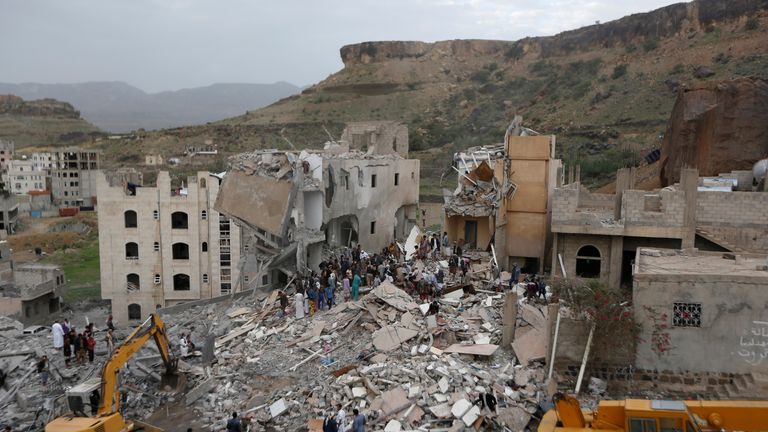Dozens arrested in Saudi 'corruption crackdown'
The purge took place as the kingdom ramped up rhetoric against Iran, and marks a consolidation of power by the new Crown Prince.
Monday 6 November 2017 22:40, UK
A purge of government officials and members of the royal family has signalled a consolidation of power by the future king of Saudi Arabia.
on corruption charges is the latest in a period of tumult as Crown Prince Mohammed bin Salman, the new heir to the throne, enacts a modernising vision for its future.
Many analysts have regarded the series of detentions, which took place over the weekend, as an attempt to consolidate power and remove opposition to future reforms.
Among those detained were billionaire businessman Prince Alwaleed bin Talal, who owns a stake in Twitter and Citigroup, and the head of the Saudi National Guard.
::
The arrests were followed by the creation of an anti-corruption committee, to be headed by the Crown Prince.
Jane Kinnimont, a senior research fellow at Chatham House, said they were "part of an ongoing project to centralise power" as well as being "a move to be seen by the public as being tough on corruption."
The dramatic purge comes after Saudi Prince Mansour bin Muqrin died in a helicopter crash near the Yemen border in the south of the country.
It also coincided with Saudi Arabia ramping up its rhetoric and action abroad.
On Sunday, the kingdom closed the borders to Yemen after a missile - believed to have been fired by Houthi rebels in the neighbouring country - was intercepted on its way to Riyadh.
Since 2015, Saudi Arabia has targeted the Houthis in a campaign which has resulted in thousands of civilian casualties.
They have been condemned by international observers, but the Saudis say the strikes are fighting aggression by Iran, its longtime foe and supporter of the Houthis.
The rival states traded aggressive rhetoric following the closure of Yemen's border, with Saudi Arabia saying it reserved the "right to respond" to the Houthi strike, which it said was an "act of war" by Iran.
Iran retaliated by accusing the Saudis of war crimes in Yemen, and denied any involvement in the Houthi strike.
Relations between the states had already worsened last week with the , who stepped down during a visit to Saudi Arabia.
Although events of the past few days have taken place on separate domestic and foreign fronts, Ms Kinnimont said, they are both indicative of a Saudi leadership which is looking to reject the old guard and take a stronger stance on particular issues.
"It's a much more activist leadership that's very much rejecting the past, reinventing the monarchy," she said. "By consolidating power, the arrests give him a firmer footing for a confrontation with Iran."






